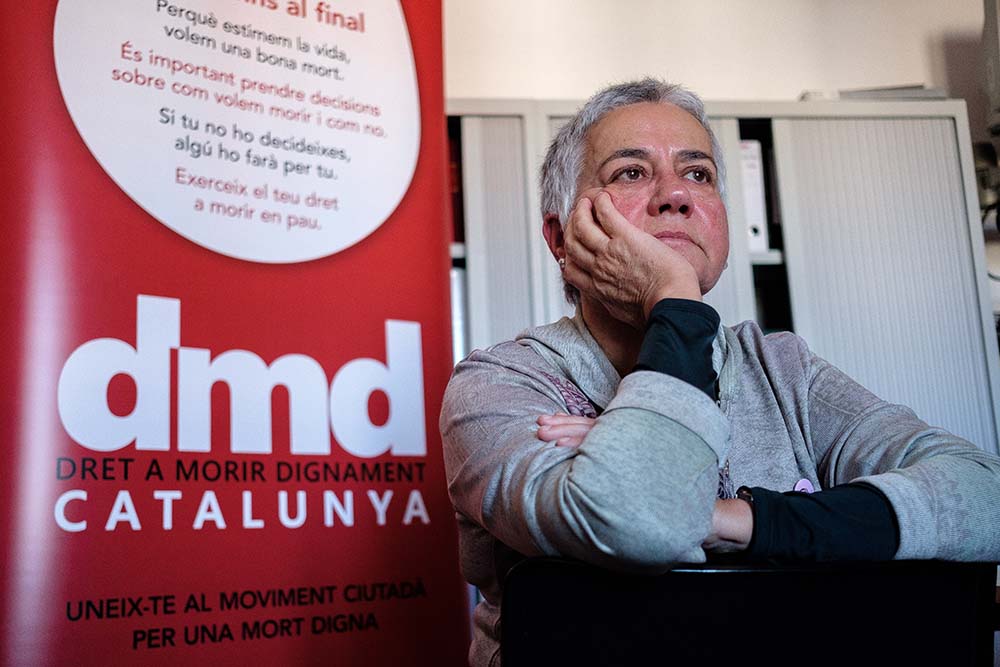
- In July 2017, the Catalan Parliament approved the proposal to decriminalize euthanasia, thanks to the work of the Dret to Die Dignament (DMD) association, which since 1984 has been working for euthanasia and dignified death. Isabel Alonso has been president of the association since 2016.

In early April, the Spanish State arrested her husband for helping to die María José Carrasco, who had been in the last phase of multiple sclerosis for years. What do you think?
First of all, I should like to express my thanks to María José and Ángel for having decided to make their case public. In fact, we know that there are more such cases that remain secret to guarantee the right to privacy. Likewise, in order to give visibility and keep alive the reflection on a problem that is kept secret, the publication of the cases has historically contributed in a remarkable way.
The fight for euthanasia began after your mother's death. What has changed your relationship with death?
It's completely changed. Before I could not talk about death. But now, much of my life moves around death. I realize that development, because I deal with the issue transparently outside society.
Is death still a taboo among people?
Of course, people talk about illness more easily than death. Interestingly, euphemisms are still being used. It is essential to break the tobacco. In our association, for example, we expressly use the word death. But many people who come to ask for information find it hard to speak transparently about death. And that, given that things have changed: According to a survey conducted by Metroscopia in February 2017, 90% of young people under the age of 35 are in favour of a dignified death.
To what extent is the Advance Wills Document (PDO) an important step in the legalization of euthanasia?
Undoubtedly, the ABD has been essential to break the taboo to which we refer and to naturally develop the debate of death. Through this document, individuals can leave the indications of the interventions and treatments they would like to receive written if a disease did not allow them to make their decision. It has to be said, however, that, although it has been an important step, disinformation is unfortunately still dominant and very few people do. Catalonia is the autonomous community that has presented the most documents.
As I mentioned earlier, although the majority of the population is in favour of a dignified death, euthanasia remains illegal. How is that possible?
As he said, because we have met the church… the pressure of the Catholic hierarchy has hampered our struggle. Well, as has historically happened with abortion or discussions about same-sex weddings. Currently, the majority of the population is in favour of euthanasia, but a 2015 study by The Economist reveals that France and Spain are the countries furthest from the opinion and law of their citizens. Spain is the case of the European Union (CAV).

What are the consequences of the non-legalization of euthanasia?
The law we proclaim would, on the one hand, prevent suffering and secrecy. On the other hand, we would also win in freedom. In fact, many families who today proclaim a dignified death carry out euthanasia in secrecy, with the consequences that this entails. And not only that, it would also prevent a lot of violent suicides if euthanasia were legal.
The DMD is 35 years old this year. What do you read about the course of the association?
The association was born with three objectives: the first, the elaboration of the document of advance directives; the second, the legalization of euthanasia; and the last, to increase the protection of freedom to end life in Spain. So we can say today that we have already achieved two of the three objectives. We just need the most important thing.
The future of the Spanish euthanasia law is now in the next legislature. Are you optimistic?
The adoption of the euthanasia law will require the victory of the political parties that are in favour of this right. We are optimistic because in 2018, for the first time in the history of Spanish parliamentarianism, two bills of euthanasia were passed: the Parliament of Catalonia and the PSOE. We have therefore been very close, as they counted the votes. But the pp and citizens have blocked all the laws...
Before I finish, what are your main challenges from now on?
The most important thing: legalizing euthanasia. In the meantime, our challenge will be to ensure the application of Law 21/2000 of Catalonia and Law 41/2002 of Spain, which guarantees the right to avoid suffering and treatment of patients.
I have always been a militant and feminist of progressive causes. I arrived at the death of my mother in Dret to Die Dignament, an association fighting for a dignified death: she was diagnosed with Alzheimer's and suffered ten years of degradation before she died. It was a hard process for the family, we lacked information and learned to live with the disease as we could. I remember when I was a high school teacher, I put the students in the movie Offshore. Then I realized that what I had lived with my mother opened the doors for a debate about euthanasia, in the struggle for a dignified death.